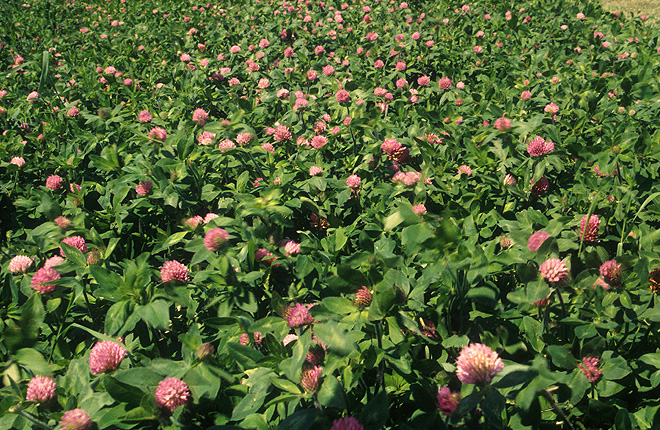Red Clover: Antibiotic Alternative for Cattle
A compound found in a common forage plant may help to reduce use of growth-promoting antibiotics in cattle, goats, sheep, and other ruminants.
At the Agricultural Research Service (ARS) Forage-Animal Production Research Unit (FAPRU) in Lexington, Kentucky, scientists discovered a natural antimicrobial compound, biochanin A, in red clover. They found that biochanin A can inhibit and kill a group of “protein-wasting” bacteria typically treated with antibiotics.
Ruminants are unique in that they have an upper digestive system that consists of four compartments, says FAPRU microbiologist Michael Flythe. The largest compartment, the rumen, contains many types of helpful bacteria, such as those that break down fiber and allow animals to get energy from grass or hay. But other types, such as hyper ammonia-producing bacteria (HAB), are referred to as “wasteful” because they digest protein and convert it into ammonia.
“When the bacteria ferment protein, it reduces protein available to the animal,” Flythe says. “And these wasteful bacteria make ammonia that can pollute the environment. It’s excreted from animals and can end up in groundwater.”
The goal in production is for the animals to absorb the protein from feed, rather than degrade it into ammonia. Traditionally, producers achieved this by giving cattle antibiotics that kill HAB, enabling the animals to get enough protein. However, there is a strong push to reduce antibiotic use for growth-promotion purposes.
Flythe first demonstrated that biochanin A could kill wasteful bacteria in the laboratory. Since then, FAPRU animal scientist Glen Aiken has conducted successful field trials with cattle given feed mixed with biochanin A. Results showed that the compound kills wasteful bacteria and promotes weight gain in animals.
“The red clover compound kills HAB, which boosts the animal’s performance and helps the environment by reducing excretion of ammonia,” Aiken says.
“Red clover is something producers would use with growing beef cattle,” Flythe says. “They would limit its use in cow-calf herds because biochanin A has estrogen-like activity that might interfere with reproduction.”
The compound differs from other treatments in that it doesn’t have to be extracted from the plant or made into a product, Flythe says. It’s found in the clover, which can easily be grown.
“In human nutrition, one trend is ‘functional food,’ which has benefits beyond basic nutrition, such as the beneficial compounds in wine,” Flythe says. “We think of red clover as ‘functional feed.’ It provides protein and is a natural and effective alternative to antibiotics.”—By Sandra Avant, ARS Office of Communications.
Key Facts
- Red clover is a forage plant for cattle.
- ARS scientists discovered an antimicrobial compound in red clover.
- The compound may help reduce antibiotic use in animals.
Full Story







